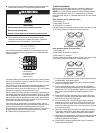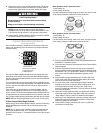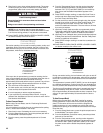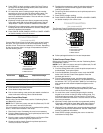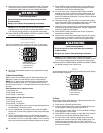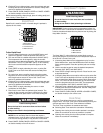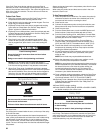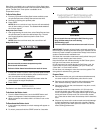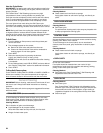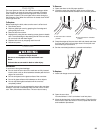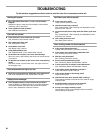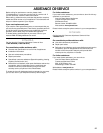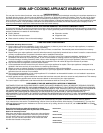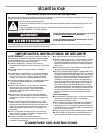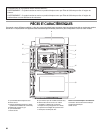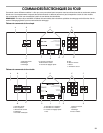
24
How the Cycle Works:
IMPORTANT: The heating and cooling of porcelain on steel in the
oven may result in discoloring, loss of gloss, hairline cracks and
popping sounds.
The CustomClean™ Self Cleaning cycle uses very high
temperatures to clean, burning residue to a powdery ash.
Once the oven has completely cooled, remove ash with a damp
cloth. To avoid breaking the glass, do not apply a cool damp
cloth to the inner door glass before it has completely cooled.
The oven lights will not work during the Self-Clean cycle.
On double oven models, only one oven can self-clean at a time. If
one oven is self-cleaning, the other oven cannot be set or turned
on.
NOTE: During self-clean, the cooling fan motor(s) will operate at
its highest speed to increase airflow to better exhaust the air
through the oven vent(s). An increase of noise may be noticeable
during and after the self-clean cycle until the oven cools.
To Self-Clean:
1. From the Modes or Setup menus, touch the quickset pad
next to Self-clean.
2. Two messages appear on the screen:
■ Remove all oven racks and pans from the oven.
■ Clean oven frame and door frame with a nonabrasive
cleaning agent. Do not clean gasket.
3. Touch NEXT.
4. Select the cleaning level by pressing the buttons:
Light (2 hrs), Medium (3 hrs) or Heavy (4 hrs).
NOTE: The oven will cool for an additional hour after cleaning
is completed.
5. To set a delayed start, touch DELAY START and set a desired
time. See the “Delay Start” section for additional information.
6. Touch START.
To Stop Self-Clean anytime:
Touch CANCEL OVEN (CANCEL UPPER or CANCEL LOWER on
double oven models). If the oven temperature is too high, the
door will remain locked. It will not unlock until the oven cools.
General Cleaning
IMPORTANT: Before cleaning, make sure all controls are off and
the oven is cool. Always follow label instructions on cleaning
products.
Soap, water and a soft cloth or sponge are suggested first unless
otherwise noted.
STAINLESS STEEL (on some models)
To avoid damage to stainless steel surfaces, do not use soap-
filled scouring pads, abrasive cleaners, Cooktop Cleaner, steel-
wool pads, gritty washcloths or abrasive paper towels.
Cleaning Method:
Rub in direction of grain to avoid damage.
■ Liquid detergent or all-purpose cleaner:
Rinse with clean water and dry with soft, lint-free cloth.
■ Vinegar for hard water spots.
OVEN DOOR EXTERIOR
Cleaning Method:
■ Glass cleaner and a soft cloth or sponge:
Apply glass cleaner to soft cloth or sponge, not directly on
panel.
OVEN DOOR INTERIOR
Cleaning Method:
■ Self-Clean cycle:
For optimal door cleaning result, wipe away any deposits with
a damp sponge before running cycle.
CONTROL PANEL
Activate the Button Lock to avoid touch screen activation during
cleaning. See “Button Lock” section.
To avoid damage to the control panel, do not use abrasive
cleaners, steel-wool pads, gritty washcloths or abrasive paper
towels.
Cleaning Method:
■ Glass cleaner and soft cloth or sponge:
Apply glass cleaner to soft cloth or sponge, not directly on
panel.
OVEN CAVITY
Do not use oven cleaners.
Food spills should be cleaned when oven cools. At high
temperatures, foods react with porcelain and staining, etching,
pitting or faint white spots can result.
Cleaning Method:
■ Self-Clean cycle: See “CustomClean™ Self-Cleaning with
Adjustable Levels and Auto Lock” first.
OVEN RACKS
Cleaning Method:
■ Self-Clean cycle:
See “CustomClean™ Self-Cleaning with Adjustable Levels
and Auto Lock” first. Remove racks, or they will discolor and
become difficult to slide. If this happens, a light coating of
vegetable oil applied to the rack guides will help them slide.
■ Steel-wool pad



